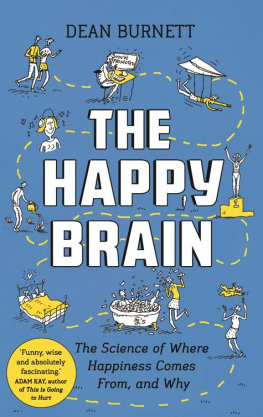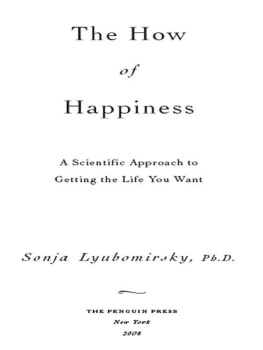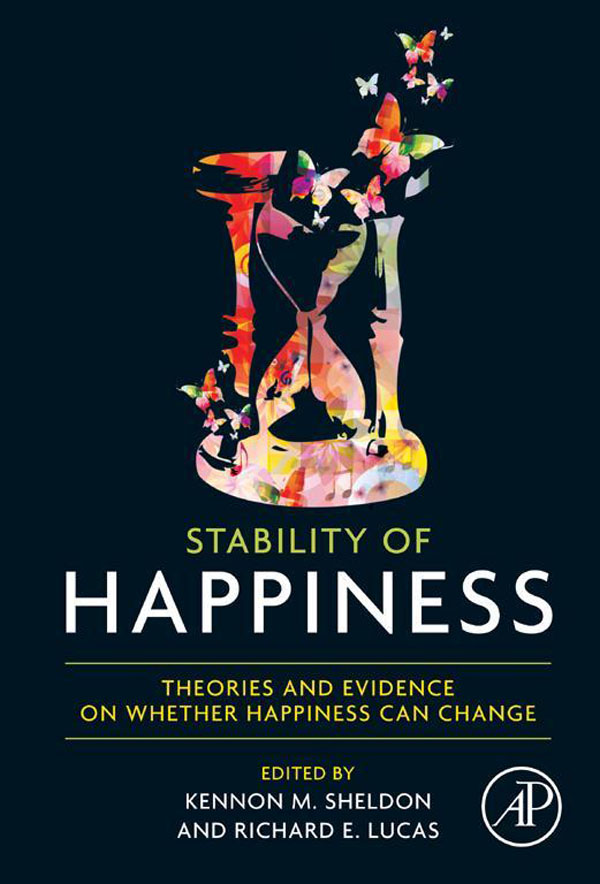Table of Contents
List of tables
- Tables in Chapter 2
- Tables in Chapter 6
- Tables in Chapter 9
- Tables in Chapter 10
- Tables in Chapter 13
- Tables in Chapter 14
List of illustrations
- Figures in Chapter 1
- Figures in Chapter 2
- Figures in Chapter 4
- Figures in Chapter 8
- Figures in Chapter 9
- Figures in Chapter 10
- Figures in Chapter 13
- Figures in Chapter 14
Landmarks
Table of Contents
Stability of Happiness
Theories and Evidence on Whether Happiness Can Change
Edited by
Kennon M. Sheldon
University of Missouri-Columbia, Columbia, MO, USA
Richard E. Lucas
Michigan State University, East Lansing, MI, USA

Copyright
Academic Press is an imprint of Elsevier
32 Jamestown Road, London NW1 7BY, UK
225 Wyman Street, Waltham, MA 02451, USA
525 B Street, Suite 1800, San Diego, CA 92101-4495, USA
Copyright 2014 Elsevier Inc. All rights reserved.
No part of this publication may be reproduced, stored in a retrieval system or transmitted in any form or by any means electronic, mechanical, photocopying, recording or otherwise without the prior written permission of the publisher.
Permissions may be sought directly from Elseviers Science & Technology Rights Department in Oxford, UK: phone (+44) (0) 1865 843830; fax (+44) (0) 1865 853333; email: for further information.
Notice
No responsibility is assumed by the publisher for any injury and/or damage to persons or property as a matter of products liability, negligence or otherwise, or from any use or operation of any methods, products, instructions or ideas contained in the material herein. Because of rapid advances in the medical sciences, in particular, independent verification of diagnoses and drug dosages should be made.
British Library Cataloguing-in-Publication Data
A catalogue record for this book is available from the British Library
Library of Congress Cataloging-in-Publication Data
A catalog record for this book is available from the Library of Congress
ISBN: 978-0-12-411478-4
For information on all Academic Press publications visit our website at elsevierdirect.com
Typeset by MPS Limited, Chennai, India www.adi-mps.com
Printed and bound in the United States of America
14 15 16 17 18 10 9 8 7 6 5 4 3 2 1

List of Contributors
Ivana Anusic , Michigan State University, East Lansing, MI, USA
Christina Armenta , University of California, Riverside, Riverside, CA, USA
Ragnhild Bang Nes , Norwegian Institute of Public Health, Oslo, Norway
Robert A. Cummins , Deakin University, Melbourne, VIC, Australia
Cody R. DeHaan , University of Rochester, Rochester, NY, USA
Ed Diener
University of Illinois, Champaign-Urbana, IL, USA
The Gallup Organization
Richard A. Easterlin , University of Southern California, Los Angeles, CA, USA
Michael Eid , Freie Universitt Berlin, Berlin, Germany
Giovanni A. Fava , University of Bologna, Bologna, Italy
Bruce Headey , University of Melbourne, Melbourne, VIC, Australia
Patrick L. Hill , Carleton University, Ottawa, ON, Canada
Katherine Jacobs Bao , University of California, Riverside, Riverside, CA, USA
Tanja Kutscher , Freie Universitt Berlin, Berlin, Germany
Richard E. Lucas , Michigan State University, East Lansing, MI, USA
Sonja Lyubomirsky , University of California, Riverside, Riverside, CA, USA
Daniel K. Mroczek , Northwestern University, Evanston, IL, USA
Ruud Muffels , Tilburg University, Tilburg, the Netherlands
Nattavudh Powdthavee , London School of Economics, London, UK
Espen Rysamb , University of Oslo, Oslo, Norway
Chiara Ruini , University of Bologna, Bologna, Italy
Richard M. Ryan , University of Rochester, Rochester, NY, USA
Kennon M. Sheldon , University of Missouri-Columbia, Columbia, MO, USA
Alois Stutzer , University of Basel, Basel, Switzerland
Malgorzata Switek , University of Southern California, Los Angeles, CA, USA
Ruut Veenhoven
Erasmus University Rotterdam, Roterdam, The Netherlands
North-West University, Potchefstroom, South Africa
Joar Vitters , University of Troms, Troms, Norway
Gert G. Wagner , German Institute for Economic Research (DIW) and Max Planck Institute, Berlin, Germany
Stevie C.Y. Yap , Michigan State University, East Lansing, MI, USA
Robin K. Young , Carleton University, Ottawa, ON, Canada
Preface
Kennon M. Sheldon and Richard E. Lucas
The right to pursue happiness is one of the dominant themes of western culture, and understanding the causes of happiness is one of the primary goals of the positive psychology movement. However, before the causality question can even be considered, a more basic question must be addressed: Can happiness change? Reasons for skepticism include the notion of a genetic set point for happiness, i.e., a stable personal baseline of happiness to which individuals will always return, no matter how much their lives change for the better; the life span stability of happiness and happiness-related traits such as neuroticism and extraversion; and the powerful processes of hedonic adaptation, which erode the positive effects of any fortuitous life change. In addition, there are considerable empirical data to suggest that over time, people keep returning to their own baseline levels of happiness. If it is true that happiness cant really change, then the search for the causes of happiness becomes almost moot. A person will either be happy or not, based on factors that are not amenable to control.
This book directly addresses this elephant in the room, the question that many positive psychologists, well-being researchers, intervention designers, and life coaches would rather avoid: Can a persons well-being be stably altered for the better, such that it remains permanently at a new, higher level than before? After an editorial introduction (Section I), the question is addressed from several theoretical perspectives (Section II; behavioral-genetic, social-cognitive, humanistic, clinical, and social-personality) and several empirical perspectives (Section III; panel studies, longitudinal studies, intervention studies, economic studies, nation-level studies), although of course there is also considerable overlap between the theoretical and empirical sections. Then, Section IV covers thorny issues in doing longitudinal research on the stability of well-being (properly dealing with cohort effects, testing moderator effects, accounting for auto-regressive effects), providing cutting-edge analytical approaches for modeling fluctuating well-being. Finally, the book concludes (in Section V) with a summary evaluation from the Yoda of well-being research, Ed Diener. To cut to the chase, the answer to the question posed above is Yes. But the route to this conclusion is winding, and the potential diversions many.
This book should be of interest to anybody in the categories listed above: positive psychologists, well-being researchers, intervention designers, and life coaches. However, the book should also be of interest to public policy makers, as they seek to broker new public affordances such as education, health, or retirement assistance; to college and even high school educators and teachers, as they seek to introduce their students to the leading frontier of these vitally important questions; and to intelligent lay-people, who are ready to go beyond the hype of the self-help bookshelves to get real scientific information on what they seek. What is it really going to take to boost ones happiness, and then to keep it at the new level?














